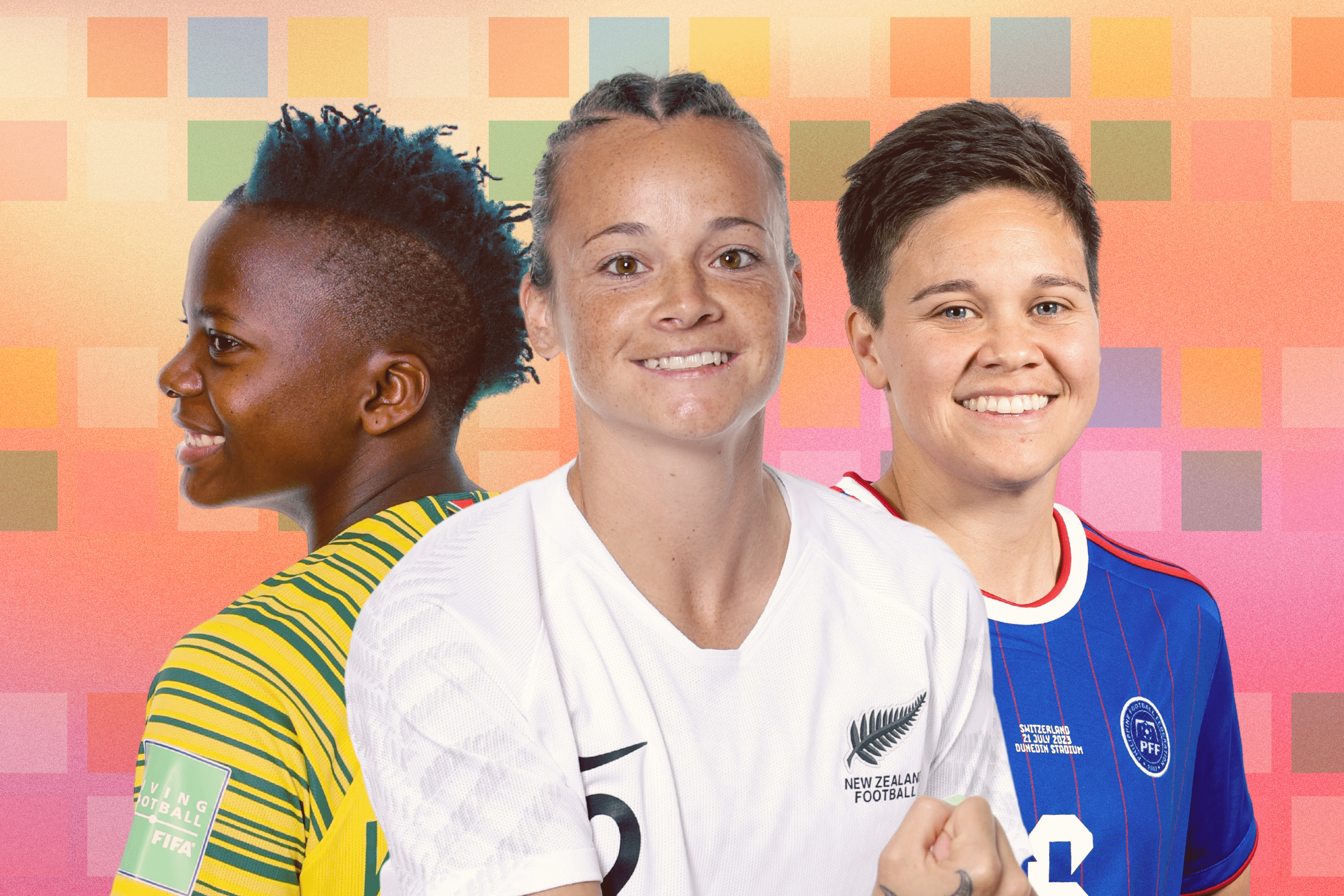Gay, lesbian, bisexual, trans and queer soccer players who are publicly out — now at least 96 in total — make over 13% of all the athletes competing in the 2023 FIFA Women’s World Cup in Australia and New Zealand, Outsports has found. In addition, at least three head coaches are publicly out.
There are many dozens of out LGBTQ athletes competing this year, by far higher than any other previous World Cup. That’s about one in every eight players. It’s an astounding number for an international competition at the highest level of a sport.
That does not include the many other LGBTQ athletes who are not publicly out.
The people Outsports features on this roll call have been determined by media reports and social-media posts. Some athletes have declared to the media they are LGBTQ. Others are simply living their lives openly on social media.
Get off the sidelines and into the game
Our weekly newsletter is packed with everything from locker room chatter to pressing LGBTQ sports issues.
It’s a testament to how far major international women’s sports have come on the presence and acceptance of LGBTQ athletes, as many of these out athletes are stars in their countries and haven’t felt the need to have a big “coming-out moment.”
Others have embraced the opportunity to ensure people across their country, and around the world, see them for who they are.
This group of out athletes is more than double the size of the out LGBTQ group of athletes who competed in the 2019 Women’s World Cup. While the number of teams in the tournament has grown by a third — from 24 to 32 — over the last four years, the number of out athletes has more than doubled. That reflects the growth of acceptance.
Almost all of these athletes are from the Americas, Europe and the host nations of Australia and New Zealand, where laws regarding LGBTQ people are generally more favorable than Africa, the Middle East and parts of Asia. Countries like Nigeria and Zambia imprison gay people. Jamaica has harsh imprisonment laws, though reports claim there is no evidence these laws are enforced anymore.
Still it’s heartening to see some women from South Africa, where homosexuality has been legal for 25 years. And, of course, we know there are more who may not yet feel comfortable being out.
In addition, at least three head coaches are publicly out: Pia Sundhage (Brazil), Bev Priestman (Canada) and Hege Riise (Norway).
Australia is the most publicly LGBTQ team in the tournament, with at least 10 out athletes — over 40% of the team — publicly out. Brazil (9), Ireland (9) and Sweden (8) are also of particular note. The United States Women’s National Team (USWNT) has three that we could determine. That’s down from five in 2019. These numbers could change through the tournament.
Twenty-two of the 32 teams — over two-thirds — are represented. At least eight of them have a team captain who is LGBTQ.
A couple names on the list to note: Megan Rapinoe of the USA and Marta of Brazil. Both of these legends are playing in their final World Cup. Rapinoe has announced her retirement. Marta is playing in her sixth Women’s World Cup. Two incredible legends.
In addition, Laurina Oliveros of Argentina had made the original roster but was ruled out due to injury.
To compile this list, Outsports has reviewed the social media accounts of over 80% of the 736 athletes competing in the Women’s World Cup, in addition to Google searches for news items and information. We did the best we could, trying to err on the side of caution. While we found many assertions or rumors about athletes being LGBTQ, we have stuck to our “publicly out” standard.
If we missed someone or got something wrong, please don’t hesitate to email us: [email protected], or direct message us on Twitter (@outsports) or Instagram (@outsports).
The list has been curated by Outsports’ Shelby Weldon, Jim Buzinski and Cyd Zeigler. Jon Holmes from Sports Media LGBT+ also contributed to the list.
Last update: July 25
Argentina
Lorena Benitez
Vanina Correa
Julieta Cruz
Romina Núñez
Yamila Rodriguez
Australia
Mackenzie Arnold
Ellie Carpenter
Alex Chidiac
Katrina Gorry
Sam Kerr*
Teagan Micah
Kyah Simon
Emily Van Egmond
Cortnee Vine
Tameka Yallop
Brazil
Adriana Silva
Andressa Alves
Barbara Barosa
Debinha
Kathellen Sousa
Lauren Leal
Leticia Izidoro
Marta
Tamires
Canada
Kadeisha Buchanan
Quinn
Kailen Sheridan
Colombia
Linda Caicedo
Daniela Montoya*
Leicy Santos
Costa Rica
María Paula Elizondo
Gabriela Guillén
Denmark
England
Jess Carter
Rachel Daly
Bethany England
Lauren Hemp
France
Pauline Peyraud-Magnin
Constance Picaud
Germany
Ann-Katrin Berger
Sara Doorsoun
Svenja Huth
Lena Oberdorf
Felicitas Rauch
Lea Schuller
Ireland
Isibeal Atkinson
Diane Caldwell
Sinead Farrelly
Ruesha Littlejohn
Katie McCabe*
Grace Moloney
Aine O’Gorman
Louise Quinn
Lucy Quinn
Italy
Rachele Baldi
Lisa Boattin
Manuela Giugliano
Elena Linari
Netherlands
Kerstin Casparij
Merel van Dongen
Sherida Spitse
Daniëlle van de Donk
Stefanie van der Gragt
Jacintha Weimar
New Zealand
Annalie Longo
Hannah Wilkinson
Michaela Foster
Ria Percival*
Norway
Anja Sønstevold
Frida Maanum
Guro Reiten
Ingrid Syrstad Engen
Philippines
Tahnai Annis*
Angela Beard
Sarina Bolden
Hali Long
Portugal
South Africa
Spain
Alba Redondo
Irene Paredes
Ivana Andres*
Teresa Abelleira
Sweden
Filippa Angeldahl
Hanna Bennison
Nathalie Björn
Magdalena Eriksson
Jennifer Falk
Lina Hurtig
Caroline Seger*
Linda Sembrant
Switzerland
USA
Kristie Mewis
Kelley O’hara
Megan Rapinoe
* Denotes team captain
There are also a number of out athletes who have been named a reserve player for their country. They will only be added to the active roster if another player is injured or otherwise unable to continue in the tournament.
RESERVES
Larissa Crummer (Australia)
Emily Gielnik (Australia)
Chloe Logarzo (Australia)
Lucy Stanforth (England)
Shanice van de Sanden (Netherlands)








































